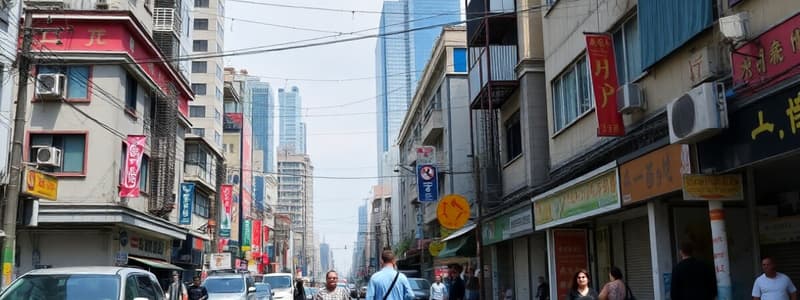Podcast
Questions and Answers
What is a significant consequence of gentrification?
What is a significant consequence of gentrification?
- Reduced economic investment in neighborhoods
- Higher demand for informal settlements
- Increased cultural diversity
- Displacement of lower-income residents (correct)
What typically triggers residential mobility due to push factors?
What typically triggers residential mobility due to push factors?
- Improved cultural amenities
- Lack of jobs (correct)
- Affordable housing options
- Better school ratings
What is downward filtering in the context of housing?
What is downward filtering in the context of housing?
- Rich individuals occupying informal settlements
- New constructions in low-income neighborhoods
- Wealthier people moving to more affluent areas
- Housing being passed down to lower-income groups (correct)
What challenge do governments face regarding informal settlements?
What challenge do governments face regarding informal settlements?
How does the growth of cities affect the informal sector?
How does the growth of cities affect the informal sector?
What is urbanization primarily characterized by?
What is urbanization primarily characterized by?
Which of the following best describes MDW cities?
Which of the following best describes MDW cities?
What is a significant disadvantage of cultural globalization in urban areas?
What is a significant disadvantage of cultural globalization in urban areas?
Residential segregation can occur due to which of the following factors?
Residential segregation can occur due to which of the following factors?
Which of the following is an example of involuntary segregation?
Which of the following is an example of involuntary segregation?
How does cultural globalization negatively impact urban environments?
How does cultural globalization negatively impact urban environments?
Which type of residential area is classified as voluntary?
Which type of residential area is classified as voluntary?
What impact does economic restructuring have on urban social inequalities?
What impact does economic restructuring have on urban social inequalities?
Flashcards are hidden until you start studying
Study Notes
Urbanization and Social Inequalities
- Urbanization is the process of people moving from rural areas to urban areas, leading to the growth of cities.
- Driven by economic, technological, and demographic factors, urbanization has transformed the world, with more people living in cities than ever.
- Urbanization in More Developed World (MDW) occurred earlier and cities are highly organized.
- Urbanization in Less Developed World (LDW) is rapid and often unplanned, resulting in informal settlements.
- Urban areas reflect social relationships, power dynamics, and inequalities, with housing and neighborhoods revealing income disparities, ethnicity, and class.
- Cultural globalization is the spread and integration of cultures on a global scale, leading to homogenization.
- Cities adopt similar features, such as international chain stores and similar architecture, due to cultural globalization.
- Cultural globalization can lead to increased understanding and connectivity, and the spread of innovation.
- Cultural homogenization, dominance of certain cultures (Westernization), and loss of local cultural identities are potential disadvantages.
- Cities may become more uniform due to cultural globalization, potentially losing unique local character.
- Urban inequality can worsen if certain cultural groups dominate others.
- Cities often exhibit extreme social inequalities as economic restructuring concentrates wealth in certain areas.
- Residential segregation is the physical separation of different social groups within a city due to income differences, ethnic or cultural divides, or discriminatory practices.
- Types of Segregation:
- Congregation: Choice to live together (e.g., Chinatown)
- Involuntary Segregation: Forced to live together due to discrimination (e.g., Ghettos)
- Types of Residential Areas:
- Enclaves: Voluntary
- Ghettos: Involuntary
- Colonies: Temporary or new settlements
- Gentrification is the process of wealthier people moving into a neighborhood, leading to displacement of lower-income residents, loss of cultural diversity, and increased inequality.
- Consequences of Gentrification:
- Pros: Economic investment, improved infrastructure, better services
- Cons: Displacement, loss of cultural diversity, increased inequality
- Government incentives can contribute to economic growth but can also lead to displacement and social inequality.
- Residential Mobility:
- Push Factors: Lack of jobs, poor housing conditions
- Pull Factors: Better schools, more amenities
- Filtering is the process of housing passing down through income groups, often through downward filtering where wealthier residents move out and poorer residents move in.
Informal Settlements and the Informal Sector
- Informal settlements (slums) are common in LDW cities, providing affordable housing but lacking essential services.
- Governments face challenges in dealing with informal settlements:
- Removal can cause displacement.
- Improvement can lead to higher rents and eventual gentrification.
- The informal sector operates outside official regulations and is essential for survival in LDW cities.
- Growth of informal economies occurs alongside city growth.
- Cities must navigate the complexities of informal settlements, balancing planning for development with the need to protect vulnerable populations.
Studying That Suits You
Use AI to generate personalized quizzes and flashcards to suit your learning preferences.




